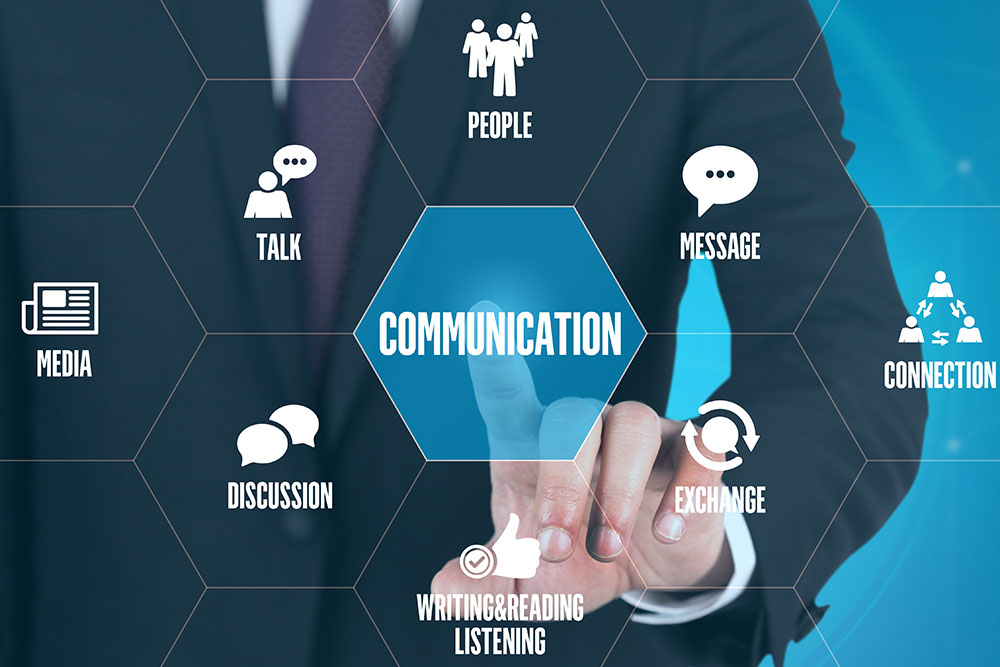
Numerous workplace problems are due to poor communication. Misunderstandings, unclear instructions, annoyed teammates and frustrated customers are all the consequence of a failure to develop this vital skill. As you can imagine, inadequate communication skills within an organisation is terrible for business all around.
This blog explores why good communication at work is essential. Making development of clear communication skills a priority alongside health and safety training will not only support the a more successful and efficient workplace, it will also make for happier more satisfied employees. So, why is communication important at work? Read on to learn more.
What is Good Communication?
Since humans evolved, we’ve depended on communication to help us survive. Without good communication skills, one of our distant ancestors wouldn’t have been able to warn a fellow tribe member about an oncoming mammoth. Or that a particular fruit was poisonous. While we no longer need to raise the alarm about speeding pachyderms, clear communication skills are still vital to our success in the modern world.
But just what is good communication? How do we define such a nebulous concept? Good communication involves more than just transmitting a piece of information. It requires participation from everyone involved, the person transmitting and the person receiving the information. It is an ongoing process of give and take between several parties. It’s not just a one-sided affair.
The process typically involves:
- Multiple interactions between people: information is transmitted and received
- Confidence and trust between the parties involved
- Visual cues to aid and signal understanding
- A clear, simple message
- Careful preparation by the transmitter
What Are the Different Types of Communication?
Communication methods have changed significantly since we used ochre to draw pictures on cave walls. A few decades ago, we might have communicated with a colleague by posting a letter, sending them a telegram or asking a switchboard operator to connect a phone call.

Nowadays, workplace communication happens via email, instant messaging or video meetings.
We don’t have to list how we can send someone a message. When it comes to sharpening up our communication skills, there are just four general types of communication to focus on:
- Verbal communication: Any type of information transmitted via the spoken word. Instructions, meetings, presentations and even a casual chat fall under this category
- Nonverbal communication: Information transmitted using body language, facial expressions or gestures. And sometimes interpretive dance, although this isn’t recommended in a work setting
- Written communication: The written word is more important than ever as a communication device. The modern world relies on websites, emails and instant messaging, as well as letters, books, manuals and the like
- Visual communication: Involves using any visual aid to convey information without needing spoken or written words such as charts, photographs, videos and graphics
Becoming a good communicator involves concentrating on improving all of these communication types. But this is easier than it seems. You don’t need to be Shakespeare to write an informative email. You don’t have to be Winston Churchill to deliver a good speech. You don’t have to be Rembrandt to prepare a good chart. And you don’t need to be Marcel Marceau to know how to use your body language appropriately. (Although dance lessons might help.)
The Importance of Good Communication at Work
Let’s get back to the question: Why is communication important? Failures in this area aren’t good news in the workplace. Failure to effectively communicate with your teammates can be disastrous. Projects can be ruined, deadlines missed and employees and customers can feel frustrated and unhappy.
Misunderstandings and miscommunications can also lead to potentially life-threatening situations. Miscommunications have caused numerous fatal air crashes and monumentally destructive workplace disasters, including the infamous BP Deepwater Horizon oil spill.
In addition to avoiding accidents, improving communication at work can bring about a range of other benefits.
Improves Employee Engagement
Good communication at work ensures that employees know what is expected of them and their responsibilities. When leaders communicate effectively, employees are more informed and trust their superiors’ judgement. It creates a strong company culture. People feel their concerns are being heard, conflicts will be resolved fairly and they know the business’s values and mission. These factors contribute to more engaged, loyal and happy employees.
Enhances Productivity
Employees spend an estimated 80% of their time communicating with each other. But much of that time (17 hours every week) is spent clearing up miscommunications. Clear communication skills avoid misunderstandings and encourage better collaboration levels between employees. Employees can focus on what they do best rather than wasting time fixing problems caused by poor communication.
Keeps People Safe
Like our ancestors, people working in hazardous environments depend on good communication skills to keep them safe. Clear, open lines of communication ensure that employees know what is happening in their immediate environment. It ensures that employees know precisely what workplace risks are, what control measures are in place and why they are in place.
How to Be a Better Communicator
If people often misunderstand you, you probably need to improve your communication. Here are seven steps you can follow to hone your skills:
- Work on developing strong verbal communication Before you speak, define what you want to say and figure out the most straightforward, shortest way to say it.
- Be an active listener. Don’t just let information wash over you. Stay engaged with the other person and demonstrate that you understand and are processing the data.
- Use your body language. Pay attention to how you’re standing and use non-verbal cues to show the other person you’re engaged with what they’re saying. Don’t hunch your shoulders or cross your arms. Stand or sit straight, maintain eye contact and nod to show understanding.
- Tailor your message for your audience. Ensure you’re communicating in a way your audience can understand. You may have to modify your language or change how you transmit information based on your audience.
- Focus on clarity. Don’t include unnecessary details (Don’t bang on about woolly mammoths, for instance). Keep your message short and to the point.
- Be reactive. Watch how your audience is reacting to your message. You may need to adjust your delivery if you feel that they aren’t taking it all in. Ask your audience for feedback if you are unsure they understand your point.
- Watch your pace. Don’t rush over important points or flood your audience with too much information. Take a calm, measured approach to transmitting your message.
Develop Your Communication Skills
Being a good communicator doesn’t come naturally to everyone. And even if you have good communication skills in one area, there may be other areas where you can improve. Take Rembrandt, for example. He was a masterful painter but may have been terrible at giving speeches.
We don’t know if that’s true. But it does get our point across. Not everyone is skilled in all areas of communication.
Our Communication Skills Training course is a great way to boost your abilities. You can learn effective communication methods and ensure your message always gets across.
























































































































































































































































































































































































































































































































































































































































































































































